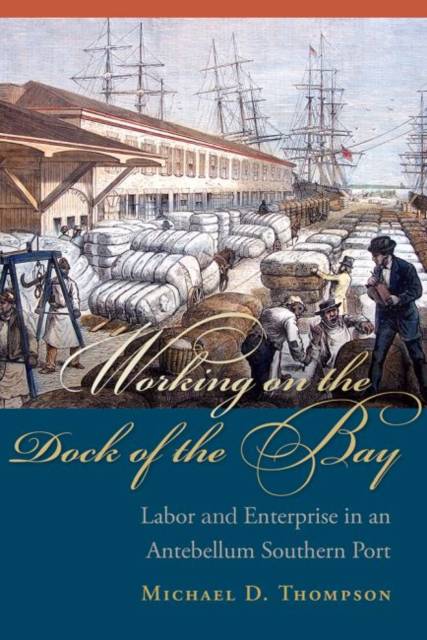
- Retrait gratuit dans votre magasin Club
- 7.000.000 titres dans notre catalogue
- Payer en toute sécurité
- Toujours un magasin près de chez vous
- Retrait gratuit dans votre magasin Club
- 7.000.0000 titres dans notre catalogue
- Payer en toute sécurité
- Toujours un magasin près de chez vous
Working on the Dock of the Bay
Labor and Enterprise in an Antebellum Southern Port
Michael D Thompson
64,95 €
+ 129 points
Format
Description
Working on the Dock of the Bay explores the history of waterfront labor and laborers-black and white, enslaved and free, native and immigrant-in Charleston, South Carolina, between the American Revolution and Civil War. Michael D. Thompson explains how a predominantly enslaved workforce laid the groundwork for a robust and effectual association of mostly black dock-workers shortly after emancipation. In the process it contextualizes the struggles of contemporary southern working people. Like their postbellum and present-day counterparts, those laboring on the wharves and levees of antebellum cities-whether in Charleston or New Orleans, New York or Boston, or elsewhere in the Atlantic world-were indispensable to the flow of commodities into and out of these ports. But despite their large numbers and the key role that waterfront workers played in these cities' premechanized, labor-intensive commercial economies, too little is known about who these laborers were and the work they performed. Though scholars have explored the history of dock-workers in ports throughout the world, they have given little attention to waterfront laborers and dock-work in the pre-Civil War American South or in any slave society. Aiming to remedy that deficiency, Thompson examines the complicated dynamics of race, class, and labor relations through the street-level experiences and perspectives of the workingmen, and sometimes workingwomen. Using this workers'-eye view of crucial events and developments, Working on the Dock of the Bay relocates waterfront workers and their labor from the margins to the center of the past, reframing their role from mere observers to critical actors in nineteenth-century American history. Organized topically, this study is rooted in primary source evidence ranging from census, tax, court, and death records, city directories and ordinances, state statutes, and wills, to account books, newspapers, diaries, letters, and medical journals.
Spécifications
Parties prenantes
- Auteur(s) :
- Editeur:
Contenu
- Nombre de pages :
- 312
- Langue:
- Anglais
- Collection :
Caractéristiques
- EAN:
- 9781611174748
- Date de parution :
- 30-04-15
- Format:
- Livre relié
- Format numérique:
- Genaaid
- Dimensions :
- 152 mm x 229 mm
- Poids :
- 630 g

Les avis
Nous publions uniquement les avis qui respectent les conditions requises. Consultez nos conditions pour les avis.






